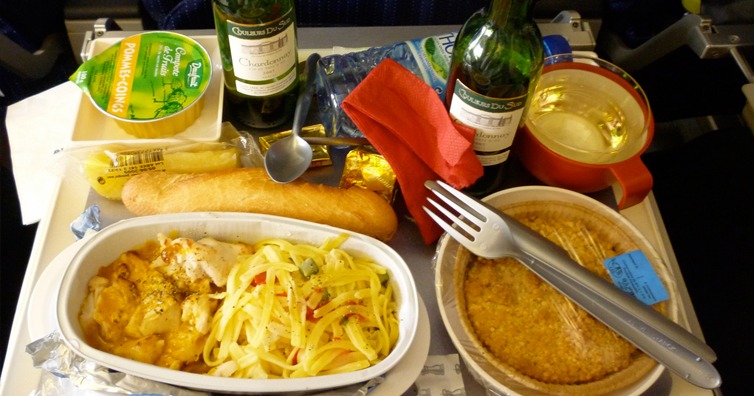We’ve all been there. Getting into an airplane hungry and waiting for the flight attendants to start serving the meals, only to order a bag of chips half an hour later because the food was just… awful. But have you ever wondered why on earth, there’s no airline out there that can serve at least a decent on-board meal?
Surprisingly enough, it’s not their fault. Yes, preparing the food in advance and having the chicken floating for hours in a cream sauce does play a significant role, but even airlines had the ability to prepare the food on-board, it would have still not taste the same as if you had the same food on the ground.
Why? Because it all has to do with low pressure, dry air and loud engine noises. (the article continues after the ad)
LOW PRESSURE, DRY AIR
A 2010 study that was commissioned by Lufthansa and conducted by the Fraunhofer Institute for Building Physics, revealed that the combination of dry air and low pressure affects the passenger’s sense of smell and thus, the way we taste. According to the research, the aircraft cabin’s in-fligh conditions repress our ability to taste salty foods. In fact, we need to add 30% more salt to a meal in order for our taste receptors to get the same taste feeling as on the ground. But even if we went on and add up 30% of salt, we wouldn’t have the same result because of one very important condition: loud noises.
ENGINE NOISES
Flight noises, such as engine noises or vibrations can be as loud as 85 decibels during flight. According to the study, this affects our ability to taste and appreciate sweet flavors. However, it enhances the flavor of ‘umami’ – you know, that savory taste thing that can be found in soy sauce and parmesan cheese. This explains why tomato juice is a popular beverage at 30,000 feet (Lufthansa noticed that Germans consumed as much tomato juice as beer on flights – a rather strange discovery considering German’s love for beer). To lab test their findings, researchers sampled 48 participants which tasted the same food both in a quite and in an “airplane-like” room. Background noises in the “cabin” room let the contestants rate the food less salty, less sweet and more crunchy.
So how do airline’s cope with these findings?
Well, they try to change the ingredients and alter the recipes. It was found that ingredients such as ginger, chile, curry, cinnamon and garlic do maintain he taste of the food, even during flight, therefore they add more of these into the sauces. In addition, they increase the umami-rich items on their menus. That’s why you see more and more airline menus having herbs, different oils, goat cheese, sun-dried tomatoes and bold seasoning that enhances the taste of food.
Interesting indeed!
If you like what you read, then you will definitely love this one: There’s A Reason Why Pilots Dim The Cabin Lights During Takeoff And Landing
Photo: Pat Guiney / Flickr
Sources: Ands and Ampersands![]() | Why Does Food Taste Bad On Airplanes? | A feast for research
| Why Does Food Taste Bad On Airplanes? | A feast for research



